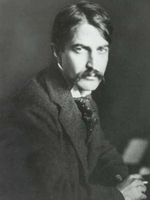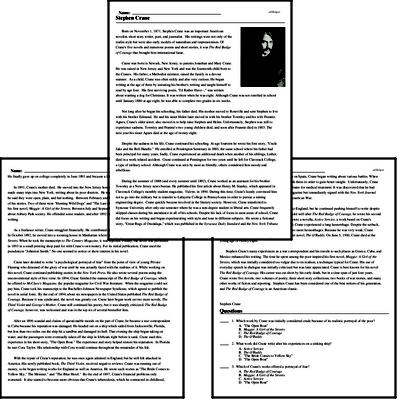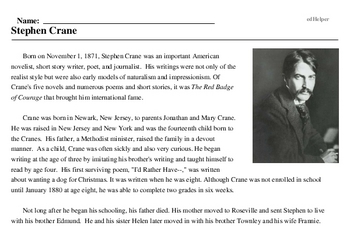Stephen Crane
Born on November 1, 1871, Stephen Crane was an important American novelist, short story writer, poet, and journalist. His writings were not only of the realist style but were also early models of naturalism and impressionism. Of Crane's five novels and numerous poems and short stories, it was The Red Badge of Courage that brought him international fame.
Crane was born in Newark, New Jersey, to parents Jonathan and Mary Crane. He was raised in New Jersey and New York and was the fourteenth child born to the Cranes. His father, a Methodist minister, raised the family in a devout manner. As a child, Crane was often sickly and also very curious. He began writing at the age of three by imitating his brother's writing and taught himself to read by age four. His first surviving poem, "I'd Rather Have--," was written about wanting a dog for Christmas. It was written when he was eight. Although Crane was not enrolled in school until January 1880 at age eight, he was able to complete two grades in six weeks.
Not long after he began his schooling, his father died. His mother moved to Roseville and sent Stephen to live with his brother Edmund. He and his sister Helen later moved in with his brother Townley and his wife Frannie. Agnes, Crane's older sister, also moved in to help raise Stephen and Helen. Unfortunately, Stephen was still to experience sadness. Townley and Frannie's two young children died, and soon after Frannie died in 1883. The next year his sister Agnes died at the age of twenty-eight.
Despite the sadness in his life, Crane continued his schooling. At age fourteen he wrote his first story, "Uncle Jake and the Bell Handle." He enrolled at Pennington Seminary in 1885, the same school where his father had been principal for many years. Sadly, Crane experienced an additional death when another of his siblings, Luther, died in a work-related accident. Crane continued at Pennington for two years until he left for Claverack College, a type of military school. Although Crane was seen by most as friendly, others considered him moody and rebellious.




